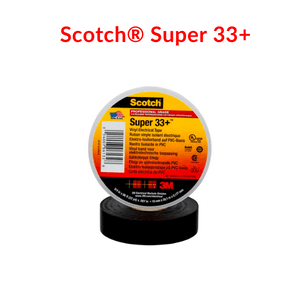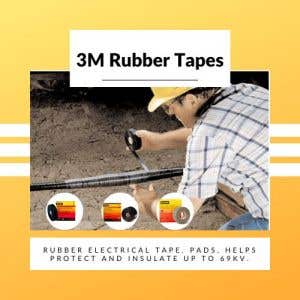Vinyl Electrical Tapes
Vinyl Electrical Tapes
Electrical tape is an essential component of any installation, repair, and manufacturing project. 3M offers durable, reliable electrical tapes, designed to protect in the most challenging environments. 3M electrical tapes help protect, seal, and mark applications in the construction and maintenance industry.
Over the past 70 years, 3M has developed long-standing expertise in tape technology. We have never stopped experimenting and inventing so that we can provide better solutions to meet our customers’ challenges
The Range of Vinyl Electrical Tapes


- Scotch® Super 33+™ Vinyl Electrical Tape is a premium grade, 0.18 mm thick, flame retardant, all weather vinyl insulating tape.
- It is designed to perform continuously between a temperature range of -18 to 105°C.
- It has excellent resistance to abrasion, moisture, alkalis, acids, corrosion and varying weather conditions (including ultraviolet exposure).
- The combination of elastic backing and aggressive adhesive provides moisture tight electrical and mechanical protection with minimum bulk.
- Scotch® Super 33+™ Vinyl Electrical Tape is an Underwriters’ Laboratories Listed and Canadian Standards Association Certified “Insulating Tape.”
Applications
- Primary insulation for splices up to 600 V and 105°C
- Protective jacketing in indoor and outdoor environments


- Scotch® Vinyl Electrical Tape 35 is a 0.18 mm thick PVC colour-coding, flame retardant tape.
- Outstanding electrical and mechanical properties make this tape excellent for use in phase identification, colour coding of motor leads and piping systems, and for marking safety areas.
- Scotch® Tape 35 operates over a wide range of temperatures between 0 to 105°
Applications
- Phase identification and marking
- Harnessing
- Insulating splices up to 600 V


- Scotch® Vinyl Electrical Tape Super 88 is a premium grade vinyl insulating tape that provides great mechanical and abrasion resistance.
- The combination of elastic backing and aggressive adhesive provides moisture-tight electrical and mechanical protection with minimum bulk in extreme temperatures.
- It offers excellent resistance to abrasion, moisture, copper corrosion, alkalis and acids.
- Offers excellent allweather performance in cold to -18°C or hot to 105°C.
- It is excellent in cold weather performance especially because it is resistance to abrasion, moisture, alkalis, acids, corrosion and varying weather conditions.
- Super 88 is compatible with solid dielectric cable insulations, and rubber and synthetic splicing compounds.
- As well as inhibits corrosion of electrical conductors, flame retardant, and is professional grade.
Applications
- Primary electrical insulation for all wire and cable splices rated up to 600 volts and 105°C (220°F)
- Protective jacketing for high voltage cable splices and repairs
- Harnessing of wires and cables


- Scotch® Heavy Duty Vinyl Electrical Tape 22 is one of 3M’s thickest (0.25 mm) premium vinyl electrical tapes.
- It is designed for insulation applications that require greater mechanical strength and abrasion resistance.
- Scotch® Tape 22 provides moisture-resistant electrical and mechanical protection with fewer wraps than thinner tapes.
Applications
- Bus bar insulation
- Cable jacket repair
How To Select The Right Vinyl Electrical Tape
Vinyl electrical tape is versatile. Its main job is to insulate, but a good tape will form a tight seal that resists corrosive contaminants. Learn how to select the right vinyl electrical tape for the best job with our guide here.


6 Key Factors to choose the Vinyl Electrical Tape
Dielectric Strength
The great insulator.
An electrician will never use common duct tape as a primary insulator in an electrical installation. Electrical tapes are made with special electrical grade adhesives which don’t contribute to corrosion. The tapes are typically IEC, CSA or UL 510 listed for a voltage rating of 600V, but can go higher with thicker tapes or more layer wraps. Dielectric strength is measured in voltage per thickness. Dielectric withstand is measured in voltage. This is the point beyond which a single layer of tape may show electrical failure.
For low voltage applications (<600V), vinyl tape is often the ‘go to’ solution for primary insulation, complex wrapping, abrasion and puncture resistance.
For medium voltage applications; rubber, mastic, and molded devices can be used to create the electrical connection insulation.
Even when these medium voltage tapes are used for splicing, vinyl electrical tape should be used as outer jacketing. Its tough backing creates a shell and provides excellent reistance to punctures, abrasion and corrosive contaminants.
Elongation
The vinyl stretch.
The capacity for a vinyl tape to stretch is one of the biggest factors in its ability to help protect and seal the installation. Good stretch equals tensile strength. That means pliability and good conformance while making a smooth, uniform and professional wrap.
- A premium vinyl tape stretches to more than twice its original length — up to 250%—before breaking.
- The UL minimum requirement for tape stretch is 150%.
- Premium vinyl tape goes to great lengths to conform, seal, and resist contaminant ingress.
- And because they stretch so well, they are less likely to break during application which saves time, materials and frustration on the job.
Temperature
Can your tape take the heat and beat the cold?
Not all tapes are made to stick in extreme temperatures. Working in cold environments, whether outside braving elements or inside a refrigeration unit, you’ll need a vinyl electrical tape with adhesive that won’t ‘freeze up’ during application. In extreme heat your tape needs a high temperature rating to help prevent peel and material deterioration, both of which compromise dielectric insulation. When evaluating vinyl tapes, the low temperature rating typically provides the lowest installation temperature. The high temperature rating indicates the highest continuous operating temperature of the tape.
- A premium grade vinyl tape will perform in a wide range of temperatures from -18ºC (0ºF) to 105ºC (220ºF).
- Only premium vinyl tapes are designed to apply and adhere in sub-freezing conditions. Most general purpose tapes will struggle to adhere to cold surfaces.
- In very hot climates, an economy tape will move and ‘slime’ the adhesive — something to consider if you’re using it for cable bundling and don’t want to scrape off goo.
- If jacketing over a mastic tape splice in a harsh environment, you’d select a premium vinyl to contain oozing.
Adhesion
Sticky factors.
Flagging and tape curl are caused by a number of factors, including adhesive degradation and improper installation. Industrial contaminants and heat can play a factor. Tape can unwind, opening a path for corrosion. Higher grade raw materials are used in the production of premium vinyl electrical tape. Adhesion to steel is part of the ASTM D1000 physical property test for film pressure sensitive adhesive (PSA) tape. It tests how much force is required to pull the tape from a steel surface.
- When your tape has to be long lasting, the adhesion matters.
- General purpose tapes for temporary holding tend to have lower adhesion-to-steel ratings.
- Premium vinyl tapes with higher adhesion ratings will stick better to some plastics, PVC, copper, and aluminum.
- They also have more stable adhesion properties over a range of temperatures which means they should stick when you need it and where you need it.
Thickness
Sword and shield.
Electrical insulation can be achieved with tape as thin as paper but to create a shell to help protect from puncture; you need to layer on the vinyl−More specifically: polyvinyl chloride, (PVC). This phenomenal plastic, invented in 1913, is used today in everything from plumbing pipes to credit cards. Early efforts to make a polyvinyl film were stymied by the plasticizer used, which degraded the adhesive. In 1946, 3M researchers created a solution and Scotch® Vinyl Electrical Tape 33 was introduced to the market.
- Vinyl electrical tapes are often 5 to 7 mil. thick (7 mil is most common in the U.S.).
- The thinner general purpose tapes are often used for bundling and harnessing cables.
- Thicker premium vinyl electrical tapes are typically used as primary low voltage insulation.
- Even thicker 8.5 and 10 mil heavy-duty vinyl electrical tapes will provide extra padding as well as excellent protection in rough environments where your cables and splices are prone to abrasion and punctures.
- Thickness also plays a part in dielectric strength which increases with each successive wrapped layer. Thicker layers provide increased UV protection for outdoor applications.
How To Select The Right Vinyl Electrical Tape
 |
 |
 |
|
| Thickness | 7.0 mil | 7.0 mil | 8.5 mil |
| Low Temperature Rating | 0°F | 32°F | 0°F |
| High Temperature Rating | 221°F | 221°F | 221°F |
| Flame Retardant | Yes | Yes | Yes |
| Sticking Power (Adhesion to Steel at 72°F) | 28 oz/in | 20 oz/in | 25 oz/in |
| Elongation | 250% | 225% | 250% |
| Breaking Strength | 15 lb/in | 17 lb/in | 20 lb/in |
| Color | Black | Multiple colors | Black |


Share this article on social media